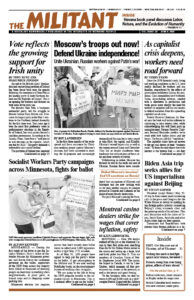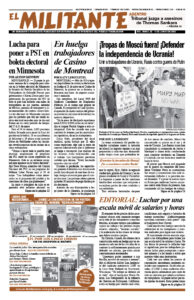Since the 2008 financial crash, living and working conditions in the U.S. have starkly declined for workers and our families, exacerbated by the effects of government lockdowns during the pandemic. Class inequalities have widened. Today, skyrocketing inflation, coupled with a slowdown in production and trade, poses more sharply the need for workers to organize and use our unions to defend ourselves from this spreading capitalist social crisis.
Federal Reserve Chairman Jay Powell says the bank will tackle inflation by continuing to raise interest rates, while acknowledging this will likely push up unemployment. Former Reserve Chairman Bernard Bernanke predicts we’re stuck with both higher prices and job losses. The bosses call this “stagflation.”
The capitalist rulers have no answer to the ups and downs of their “business cycle.” To them the only figure that truly matters is the bottom line — are they extracting enough profits off the backs of our labor.
These conditions aren’t just battering workers and farmers in the U.S. Out-of-control inflation is a worldwide phenomenon, spurring protests from Sri Lanka to Iran. Vladimir Putin’s war against Ukraine, and the sanctions and counter sanctions imposed by Washington and other capitalist governments that inevitably fall hardest on working people, further erode the conditions we face.
At the same time, industrial production in China, whose leaders claim to head the world’s largest economy, fell 3% year on year in April.
Global economic outlook is “challenging and uncertain,” Treasury Secretary Janet Yellen admitted May 18. Since the start of the year, the stock market has fallen 18%, with over $7 trillion going up in smoke.
As the central bankers raise interest rates, workers feel the effects right away. Mortgage interest rates rose to 5.2% last month, and average mortgage repayments are now 70% higher than before the pandemic.
Credit card debt rose from $804 billion to $856 billion in the last three months of 2021, the biggest quarterly increase on record. The rise in the Fed’s rates will increase credit card interest rates. In March, delinquencies on credit card and personal loans rose for the eighth month in a row. Unpaid debt on auto loans and leases hit an all-time high in February.
Workers need to organize
“Workers need to join together to fight for protection from the impact of this crisis,” Lea Sherman, Socialist Workers Party candidate for U.S. Congress from New Jersey, told the Militant. “Strikes for better wages and conditions by autoworkers in Wisconsin and Iowa and refinery workers in California point the way forward.
“Bosses push to get more work out of fewer of us. Workers and our unions need to fight for 30 hours work for 40 hours pay to spread the available work around, to stop being saddled with longer and more arbitrary schedules, and to combat bosses’ speedup.”
Today’s inflation hits hardest at the things workers need most — food, fuel, electricity and other necessities. Rapid price rises mean more workers are struggling to put food on the table. The Salvation Army reports an increase in people who previously used food banks to supplement their shopping but now depend on them as their primary source of food. Officials at the Feeding America food bank network say 15% more people used their facilities in March.
Some 36 million workers who depend on federal food assistance programs are able to buy less and less. Their benefits are calculated on the price of food last summer, but food inflation in April rose 9.4% over the past year.
“To protect our wages from inflation,” Sherman said, “we need cost-of-living adjustments in every contract and all government benefits, so that when prices rise our wages and Social Security go up immediately and automatically.”
Social crisis
Today’s fall in the living standards of workers and farmers is part of a decadeslong broader social crisis spawned by capitalism in decline. This breeds insecurity and despair. Drug overdoses and suicide rates are growing in rural areas and cities alike.
Deaths from drug overdoses soared in 2020. This was partly a result of government pandemic shutdowns that imposed social isolation and closed the 12-step programs that provide vital human contact and support for those battling alcoholism and addiction.
Among Blacks the drug mortality rate has quadrupled in less than eight years. Rising overdose deaths have affected working people as a whole in small cities and rural areas.
Overdose deaths rose again by 15% to nearly 108,000 in 2021, a record-breaking level. For the past 50 years overdose deaths have increased every single year, except once, in 2018. The Centers for Disease Control and Prevention attributes this to the growing spread of fentanyl, a synthetic opioid, on the streets. Fentanyl overdoses accounted for two-thirds of the 1 million drug deaths in the U.S. since 1999.
Democrats and Republicans of all stripes bemoan this spreading crisis. But none have a solution, which would mean an assault on the workings of the dog-eat-dog capitalist system they are pledged to support.
“Only by joining together and fighting for what we need can working people win protections from unemployment, inflation and today’s social crisis. In doing so we begin to discover our own capacities,” Sherman said. “That’s the road to transforming ourselves, gaining the class consciousness, discipline and confidence we need to be able to build a movement of millions that can put an end to the social ills bred by capitalism. We need to take political power into our own hands.”

